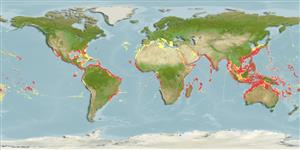Common names from other countries
sub class Elasmobranchii (ฉลามและกระเบน) (sharks and rays) >
Carcharhiniformes (Ground sharks) >
Carcharhinidae (Requiem sharks)
Etymology: Carcharhinus: karcharos (Gr.), sharp or jagged; rhinus, an ancient name for sharks, from rhine (Gr.), rasp, both words alluding to a shark's jagged, rasp-like skin. (See ETYFish); altimus: Latin for highest, allusion not explained nor evident. (See ETYFish).
Environment: milieu / climate zone / depth range / distribution range
นิเวศวิทยา
เกี่ยวกับทะเล,น้ำเค็ม เกี่ยวกับหินโสโครก; ระดับความลึก 12 - 810 m (Ref. 58302), usually 80 - 220 m (Ref. 9253). Subtropical; 46°N - 31°S, 180°W - 180°E
Circumglobal: tropical to temperate watersin the Atlantic, Pacific and Indian oceans. Introduced in the Mediterranean via Gibralltar.
Length at first maturity / ขนาด / น้ำหนัก / Age
Maturity: Lm 230.0, range 205 - 282 cm
Max length : 300 cm TL เพศผู้/กระเทย; (Ref. 2334); common length : 250 cm TL เพศผู้/กระเทย; (Ref. 26999); น้ำหนักสูงสุดที่มีการรายงาน: 167.8 kg (Ref. 40637)
เงี่ยงครีบหลัง (รวม) : 0; เงี่ยงครีบก้น: 0. A heavily-bodied, cylindrical shark with a large, long and broad snout, long nasal flaps and high, triangular, saw-edged upper teeth; interdorsal ridge high and prominent; pectoral and dorsal fins large and straight (Ref. 5578). Grayish with no conspicuous markings, white below (Ref. 5578); inner corners of pectoral fins blackish (Ref. 9997).
Found near the edge of the continental and insular shelves and uppermost slopes (Ref. 244). Rare in shallow waters (Ref. 9997), bottom associated near shelf breaks and drop-offs; young may occur at 25 m (Ref. 58302). Feeds on bony fishes, other sharks, stingrays, and cuttlefish (Ref. 244). Viviparous (Ref. 50449). Utilized for fishmeal, liver oil, and shagreen (Ref. 9997). Minimum depth reported taken from Ref. 244.
Viviparous, placental (Ref. 50449). Gives birth every second year with 1-13 (average 9) pups per litter (Ref. 58048). In the Mediterranean, sharks give birth in August and September, however in Madagascar, young are born in September and October (Ref. 244). Size at birth 60-75 cm (Ref. 6871); 70-90 cm TL (Ref.58048). Distinct pairing with embrace (Ref. 205).
Compagno, L.J.V., 1984. FAO Species Catalogue. Vol. 4. Sharks of the world. An annotated and illustrated catalogue of shark species known to date. Part 2 - Carcharhiniformes. FAO Fish. Synop. 125(4/2):251-655. Rome: FAO. (Ref. 244)
IUCN Red List Status (Ref. 130435)
Human uses
การประมง: มีการค้าเพียงเล็กน้อย
เครื่องมือ
Special reports
Download XML
แหล่งที่มาจากอินเตอร์เน็ต
Estimates based on models
Preferred temperature (Ref.
115969): 13.8 - 26.5, mean 19.9 (based on 875 cells).
Phylogenetic diversity index (Ref.
82804): PD
50 = 0.5000 [Uniqueness, from 0.5 = low to 2.0 = high].
Bayesian length-weight: a=0.00331 (0.00178 - 0.00617), b=3.11 (2.96 - 3.26), in cm Total Length, based on LWR estimates for this species & Genus-body shape (Ref.
93245).
ระดับชั้นอาหาร (Ref.
69278): 4.5 ±0.3 se; based on diet studies.
ความสามารถในการกลับคืนสู่ปกติ (Ref.
120179): ต่ำมาก, เวลาต่ำสุดที่จะทำให้ประชากรเพิ่มขึ้นเป็น 2 เท่าใช้เวลามากกว่า 14 ปี (Fec=1-13;).
Fishing Vulnerability (Ref.
59153): Very high vulnerability (90 of 100).
